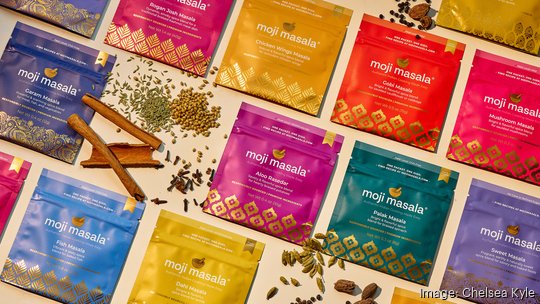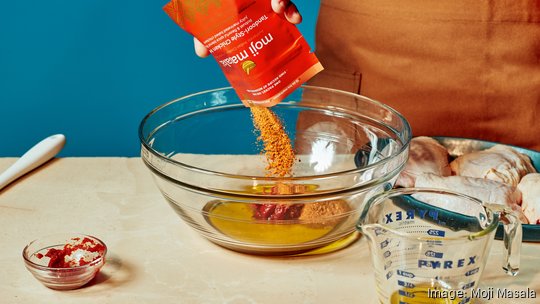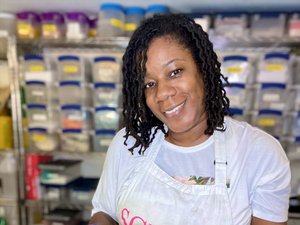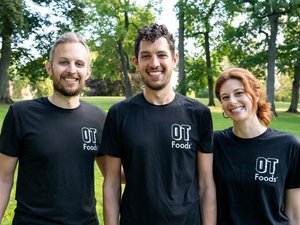
After relocating their startup from New York to Philadelphia, a husband and wife are looking to scale their Indian cuisine pre-measured spice blends company as sales double month over month.
Shireen Qadri and JD Walsh launched Moji Masala in late 2019 and relocated the business to Philadelphia in 2022. They’ve spent much of the past year rooting themselves in the community and are now looking to grow the business, which is already available through online marketplaces Amazon, Walmart and FreshDirect, as well as wholesaler Faire.
Their growth push is focused on adding new retail partners and wholesale distributors, particularly for national co-ops. They are also looking to break into restaurants and country clubs, pursuing distribution options in Europe and the eventual addition of new products with a potential long-term goal of making Moji Masala more of a lifestyle brand.
Food remains the heart of the business, which was launched as a way to introduce people to Kashmiri cuisine as well as preserve those flavors for families who emigrated out of that region of India.
Moji Masala offers pre-measured spice blends for dishes from Kashmir with the goal of giving users an accessible way to prepare such foods. “We’re offering you the experience of actually enjoying an Indian meal,” Qadri said. “It’s designed to easily to invite friends over to share the meal.”
Qadri and her family originally hail from the northern region of India, having relocated to Maryland when she was a child. The dozen or so Moji Masala offerings contain the spice blends for a single dish like rogan josh masala, aloo rasedar masala, and tandoori chicken masala. The blends – which are made from organic hand-ground spices sourced from around the globe – are largely intended for braising or as marinades and take the guesswork out of preparation. It also means that consumers don’t have to buy the dozen-plus individual spices that a single dish often calls for.
“We want to dispel the myth that [preparing Indian food] has to be challenging,” Walsh said.

More than providing the spices, the packaging includes a shopping list and a QR code that directs users to a recipe and video demonstrations. Those were critical aspects for the brand and perfecting those elements took about three years.
“That is the way you enter Indian food. It is home cooking. It is never going to be in a restaurant,” Qadri said.
The tandoori chicken masala is a best seller and calls for chicken thighs, olive oil and tomato paste. The chicken marinates in the mix for 12 to 24 hours before baking. A single packet – along with the other ingredients – can serve four to five adults.
The spice blends cost between $4 and $10 each depending on the dish.
Qadri and Walsh see them as a more affordable option for a high-end culinary experience than dining out. As such, they’ve seen their product gain popularity with a wide-ranging demographic, from individuals in their 20s up to their 70s.
The disparate demographic points to a shared commonality: “They are home cooks that like that chef experience,” Walsh said. “They like the theater of being able to cook and then present [the food] so they get the win at the table and then the food is really good.”
Children also enjoy Moji Masala's dishes, Qadri and Walsh said, making the meals great for families.
Their own daughter was a key part of their decision to pursue the business. After she was born, Qadri and Walsh – who is originally from Long Island and of Irish ancestry – were making frequent trips between their then home in New York City and Maryland, where Qadri’s family still lives. Both led successful careers – Qadri in finance, Walsh in sports and sports marketing. He worked as a basketball coach and sports diplomat for the U.S. Department of State, including six years in Asia and India. That left both with little time for cooking, especially intricately layered Indian dishes.
On one trip to Maryland, Qadri’s mother gave them pre-measured packets to take home so they could make some of her dishes. That struck a chord with the pair, who also wanted to hand down the traditional dishes to their daughter. Having a parent who prepared such dishes meant that for years Qadri didn’t learn how to make many of them herself. She recognized that if she didn’t learn, those recipes could be lost.
“You can’t get these recipes from cookbooks,” Qadri said.

That was a problem that they recognized other members of their generation – particularly first- and second-generation Indian Americans – were also struggling with. Many had successful careers and little time to prepare the foods they’d grown up with – much less learn how to make them.
In addition to online marketplaces, the blends are available today in a number of local spots like Herman’s Coffee, The Spice Rack, Riverwards Produce and Salt and Vinegar, all in Philadelphia, in addition to Weavers Way Co-op in Ambler and Martindale’s Natural Market in Springfield. Moji Masala is also sold in stores in Massachusetts, New York and Wisconsin.
With many Kashmiri recipes already in the mix, their goal is to branch into cuisines from other parts of India, something they’re just starting to work on. “Our vision is to represent the subcontinent through a dish that's truly handed down from somebody I know, whether it's an aunt or friend's mother, or so on and so forth,” Qadri said.
They also recognize that for many in the U.S., this could be their only authentic taste of Kashmir. “For me, it's just bringing [this cuisine] to all the people who just don't have the experience eating it or cooking it,” Qadri said.
The couple, who live in Chestnut Hill, currently hand grind and blend all of their spices out of the Culinary Collective in the Bridesburg neighborhood of Philadelphia. They are currently looking for their own space and hoping to lock that in “pretty soon,” Qadri said. With a new space, they might offer some retail, but don’t expect their operations to change dramatically aside from scale.
“We don’t have a co-packer by choice,” Walsh said, noting that they prefer to grind spices in different ways depending on the profile they’re going for, something that could be lost with a large producer. “It’s a very human product.”
The company – which has been self-funded so far – is profitable and seeing sales double month over month. Launched as a direct-to-consumer brand, business is now about evenly split between e-commerce and retail. As they grow, they’re also considering expanding into wholesale distributors such as Sysco and Aramark, as well as restaurants and country clubs.
For the time being, they are funneling revenue back into the business to help it continue growing organically. “We want to keep it that way – we want to control our own destiny as much as we can,” Walsh said.







